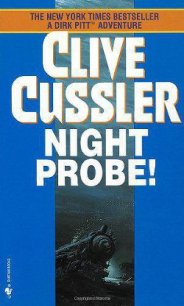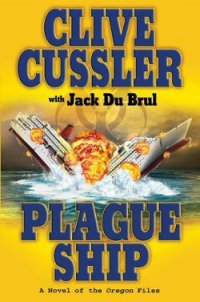Flood Tide - Cussler Clive (читать книги без txt) 📗
“As soon as we reach our drop zone, I'll release the communications-relay antenna so we can remain in contact after you've returned to the Oregon. When I drop the antenna, its weighted line will settle into the silt and it will act as a buoy.” “What is your range?”
“Underwater, we can transmit and receive up to fifteen hundred yards.”
“Understood,” said Cabrillo. “Stand by, we're only a short distance away from the liner's stern. I won't be able to come in much closer than fifty yards.” “Any sign of a security force?”
“The whole ship and dock look as dead as a crypt in winter.” “Standing by.”
Cabrillo was better than his word. He slowed the launch until it barely maintained headway and steered it almost directly under the stern of the United States. The sun was coming up as a diver slipped over the side and descended down the towline to the submersible. “Diver is down,” Cabrillo announced.
“We see him,” answered Pitt, looking up through the transparent nose. He watched as the diver released the connection mechanism mounted on top of the submersible between the twin tubes and gave the familiar “okay” sign with one hand before disappearing up the towline. “We are free.”
“Make a turn forty degrees to your starboard,” directed Cabrillo. “You are only eighty feet west of the stern.”
Giordino gestured up through the murky depth at the immense shadow that gave the illusion it was passing over them, The seemingly unending shape was enhanced by the sunlight filtering between the dock and the gigantic hull. “We have her.”
“You're on your own. Rendezvous will be at four-thirty. I'll - have a diver waiting at your antenna mooring.”
“Thank you, Juan,” said Pitt, feeling free to use the chairman's first name. “We couldn't have done it without you and your exceptional crew.”
“I wouldn't have it any other way,” Cabrillo came back cheerfully.
Giordino gazed in awe at the monstrous rudder looming overhead and pressed the lever that dropped the antenna's anchor into the silt on the bottom. From their position the hull seemed to travel off into infinity. “She appears to be riding high. Do you recall her draft?”
“I'd have to make a wild guess,” said Pitt. “Somewhere around forty feet, give or take?”
“Judging from the look of her, your guess is a good five feet on the low side.”
Pitt made Cabrillo's course correction and dipped the Sea Dog /Ts bows into deeper water. “I'd better be careful or we'll bump our heads.”
Pitt and Giordino had worked as a team on countless dives into the abyss and operated a score of submersibles on various NUMA projects. Without any discussion each man spontaneously assumed his well-practiced responsibilities. Pitt acted as pilot while Giordino kept an eye on the systems monitor, operated the video camera and worked the manipulator arm.
Pitt gently eased the throttle lever forward, directing the sub's movement by angling and tilting the three thrusters with the handgrip controls, dodging beneath the giant rudder and banking around the two starboard screws. Like some nocturnal flying machine, the submersible slipped around the three-bladed bronze propellers that spanned the watery gloom like great, beautifully curved fans. The Sea Dog II continued silently through the water, which became an eerie opaque green.
The bottom appeared as distant land through a fog. Assorted trash dumped off ships and the dock over the years lay partially embedded in the silt. They soared over a rusting deck grate that was home to a small school of squid that drifted in and out of the parallel rows of square openings. Pitt guessed that it had simply been dumped by dockyard workers sometime in the past. He stopped the thrusters and settled the craft into the soft bottom beneath the liner's stern. A small cloud of silt filtered up and outward like a brown vapor, momentarily obscuring any view through the forward canopy.
Overhead, t ic hull of the United States stretched above them into the dusky water like a dark, ominous shroud. There was a sense of loneliness on the desolate bottom. The real world above did not exist.
“I think it best if we took a few minutes and thought this thing out,” said Pitt.
“Don't ask me why,” said Giordino, “but a dumb joke from my childhood suddenly popped into my head.”
“What joke is that?”
“The goldfish that blushed when it saw the Queen Mary's bottom.”
Pitt made a sour face. “The simple things that come from simple minds. You should rot in purgatory for resurrecting that old turkey.”
Giordino acted as if he didn't hear. “Not to change the titillating subject, but I wonder if these clowns thought of using eavesdropping sensors around the hull.”
“Unless we bump into one dangling from the dock, we have no way of telling.”
“Still pretty dark to make out any detail.” “I'm thinking we can set our light beams on the low end and begin inspecting the keel. Our chances of being spotted that deep beneath the hull are unlikely.”
“Then as the sun rises higher in the sky, we can work out and up toward the waterline.”
Pitt nodded. “Hardly a brilliant plan, but it's the best I can come up with under the circumstances.”
“Then we'd better get a move on,” said Giordino, “if we don't want to suck our oxygen dry.”
Pitt engaged the thrusters, and the submersible slowly rose from the silt until it was only four feet below the keel. He concentrated on keeping the Sea Dog II on an even plane, glancing every few seconds at his positioning monitor to guide him on a straight track while Giordino peered upward, his eyes searching for any irregularity that indicated an exit or entry hatch that had been riveted in the bottom of the hull, taping any suspicious piece or workmanship with the video camera. After a few minutes, Pitt found it more expedient to ignore the monitor and simply follow the horizontal seams between the hull plates through the transparent canopy.
On the surface, the sun's rays pierced the depths, increasing visibility. Pitt switched off the exterior lights. The steel plates, black in the earlier darkness, now became a dull red as the antifouling paint became more evident. There was a slight current caused by the outgoing tide, but Pitt held the submersible steady as the inspection continued. For the next two hours they glided back and forth as if mowing a lawn, each man strangely silent, intent on his job.
Suddenly, Cabrillo's voice broke the silence. “Care to make a progress report, gentlemen?”
“No progress to report,” Pitt answered. “One more sweep and we'll have finished the bottom of the hull. Then it's up the sides toward the waterline.”
“Let's hope your new paint job makes it tough to spot you from the surface.”
“Max Hanley and his crew laid on a darker green tint than I'd planned,” said Pitt. “But if nobody stares down in the water, we should be okay.”
“The ship still looks deserted.”
“I'm glad to hear it.”
“See you in two hours and eighteen minutes,” said Cabrillo jovially. “Try not to be late.”
“We'll be there,” Pitt promised. “Al and I don't want to hang around down here any longer than we have to.”
“Standing by and out.”
Pitt leaned his head toward Giordino without looking at him. “How's our oxygen supply?” he asked.
“Tolerable,” Giordino replied briefly. “Battery power still reads steady, but it's creeping slowly toward the red line.”
They finished the final run working out from the keel. Pitt guided the little craft along the section of the hull that curved upward toward the waterline. The next hour passed with agonizing slowness, and nothing out of the ordinary was revealed. The tide turned and began flowing in from the sea, bringing cleaner water and increasing visibility to nearly thirty feet. Swinging around the bow they began working the starboard side, which was moored next to the dock, not rising to within ten feet of the surface.




